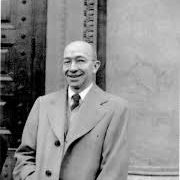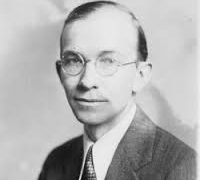All together now: Inky, kinky, commie, finkie
mainIt’s a line from a new opera on a 1960 gay witch hunt at Smith College, Mass., where a professor was arrested in possession of gay porn and saw his career and life destroyed.
Now, composer Eric Sawyer of Amherst College and lyricist Harley Erdman of UMass have turned the tragedy into an opera, The Scarlet Professor, to be premiered in September on the site of Newton Arvin’s downfall.

You can read more, and hear an excerpt, here.






It seems that a deplorable, shameful incident is being turned into a palatable PC production with a morally-appealing twist so that audiences can feel good about themselves. We also have musicals about Anne Frank, fulfilling the same function. Is it progress?
I agree with the comment above. The U.S. conducting “witch hunts” and demonising other innocent human beings is nothing new and is part and parcel to their culture and political system. Their history is full of such witch hunts, whether against the native American tribes who they decimated and tried to kill off after establishing that they were a threat, whether it was the African Americans, who were brought there in chains and then put into servitude and when they finally got out of slavery they demonised them and still do, then there were the gays…and then the communists…and many many more in between. Today they demonise and have a witch hunt for Muslims. Why do I say all of this, simply because making an opera out of this, while it may draw attention to that particular witch hunt, will probably do nothing to make Americans and others open their eyes and see that this particular witch hunt, against an innocent gay man, is nothing unusual in their culture and turning it into entertainment will sadly, I’m afraid, do nothing to stop the next witch hunt of some group or minority that they will no doubt do in the future.
Having been married to a Japanese-American woman, I know first-hand what happened during the witch hunt for Japanese people in the United States from early 1942, including interning fully integrated, English speaking, U.S. born Japanese-Americans who were peacefully living their lives when Pearl Harbor happened. All people of Japanese origin or ancestry were part of a relentless witch hunt by Americans. My wife’s parents were interned in a U.S. concentration camp, were beaten, tortured and made to feel sub-human. I think that composer Eric Sawyer should write an opera, in several acts, each dealing with those that were part of a different witch hunt in America. Gay stories may be better at the box office, but if that is the reason, then Mr. Sawyer is only exploiting the misery of one for finding a hook to get an audience in.
Perhaps Sawyer didn’t write about the Japanese internment because that event has already been mined.
There are already both an opera, a Broadway-style musical and several plays devoted to the subject of the WWII Japanese internment.
Perhaps he wished to bring attention to an event not as well known.
Ever heard of Alan Turing?
Yes, indeed. Why bother composing an opera if it won’t change the trajectory of an entire society?
Well said. I taught a course in Historiography grounded in original documents, primary sources, relating to the Salem witch hunts and the trials. That caused me to think of what came after: the immigration laws of 1800, the genocidal attacks on Native Indians, the Civil War, turning on Irish Americans, suspecting all Italian Americans of being anarchists, the atrocious sedition law of 1917, the mortal fear of Communism, internment of Japanese Americans, HUAC and McCarthyism…. and so it goes to this very day. I’m inclined to suspect a collective paranoia, perhaps originally instilled in the first settlers living surrounded by dense, dark forest possibly full of God knows what, in their minds. I cannot but generalise here, but I should say that some 50% of the populace of the U.S. are afflicted with this, and that it has gone so deep that it may be that the state itself has become psychotic. I thought this before the present situation came to be, but observing the Republican majority in Congress, Trump, the edging toward an unthinkable war, the efforts to prevent African Americans voting, White Nationalism, barring Muslims, survivalists holed up in Montana and Idaho…well, it’s a long list of symptoms but all told they beg for diagnosis of a patently unhealthy nation. My chief concern is for the half of the populace who are mighty good people from whom so many of my friends have come.
Steven,
So refreshing to read your thoughts. They resonate completely with me and I too believe that the U.S. is a deeply sick and borderline psychotic nation, always looking for the bogeyman, who appears in ever-changing and endless guises there. It never ends and only now seems to get worse and worse. How can a nation with such a long history of witch hunts and accusing in turn nearly everyone and everything of every possible sin and wrongdoing imagine, for just one minute, that it is just like everybody else. It is indeed exceptional, but not for the right reasons. I fear for the future and have enormous sympathy for, as you say, “the half of the populace who are mighty good people” who I know are suffering deeply, as I speak and meet many of them.
As always, I marvel at your ability to judge things without having seen them, or in this case, without their even having been produced yet.
You say that as if it were a bad thing.
Didn’t someone once advise those living in glass houses to avoid throwing stones?
Paul’s statement above ignores several millennia of horrendous acts that Europeans have visited upon one another and upon foreigners. England had centuries of gay witch hunts – remember Oscar Wilde and Alan Turing. Slavery goes back millennia and we all know about what the Jews suffered over many centuries in Europe. King Ferdinand and Queen Isabella did their best to get rid of them in Spain and Jews were treated no better in many other European countries throughout history – just think of the Catholic Church and its anti-protestant/anti-Jewish culture. So let’s not be too quick to point fingers and look at your own country’s past sins before adopting such a smug and facile attitude.
As for taking the position that it’s art’s job to make anyone do or think anything in particular, is this really true? And who said so?
Should we take away from Madame Butterfly the admonition not impregnate foreigners and then try to take the child away once one has re-married? Is Wozzeck supposed to inform us not to ignore PTSD because it can lead to killing our mates? If this isn’t so, why should an opera about Newton Arvin be expected to impart anything but the story itself? John, if Wozzeck or Butterfly or even Peter Grimes don’t make us feel good about ourselves (at least I’ve never had that reaction) why would the Newton Arvin story do so as well. And if it did, so what?
That is not the point. Imagine the theme of Wozzeck treated in the style of a musical, it would take away the horror of the subject. Musicals about Anne Frank are similarly abject for that very reason. Turning a serious theme into entertainment is pasting over its reality. It all depends upon how subjects are treated.
PS: And then, there is the escape route for the composer: the more trendy, PC, shocking, unusual, etc. etc. a subject is, the music can hide under its cover; it will help with the marketing and within the production as a whole, the music will hardly be noticed.
I understand and agree with you on principal with your first statement. (In general, I don’t care much for musicals – my idea of hell is having to listen to The Sound of Music for all eternity) But where we part ways is your PS. I don’t know this composer, his manner of composing, or even his intentions but I think that, while you may or may not be right about those intentions, it’s a bit cynical – or at least premature – to cast aspersions on them, whatever they may be.
It seems that your position is that this composer’s language is a little more than a strategy that he chooses for a political purpose. But then again, he may simply compose (as many do) in the language that is the most natural to him – as treacly as it might be. In any case, a creator’s intentions are – in the end – irrelevant . How many great compositions have been written solely for the money or to advance one’s position? The list begins with Bach, Beethoven, Mozart, Strauss and goes on forever. And many of the most sincerely created works are crap. Either the end result is artistically viable or not. And for that, only time will tell no matter what we may think of it from our own current vantage points or however sound are reasoning may be. So, my only objection is the assumption of the composer’s motive. You may be right or wrong, but in the end, I’m not sure it’s terribly relevant.
Yes, all that is true. My assumption was based upon the introductory video and the sparse sounds appearing in it, which did expect the worst. But of course I may be utterly wrong and the result may turn-out to be very good because of the music. I would think that such outcome would be deserved by the subject, and not the other way around – that the music is successful because of the trendiness and PC nature of the subject.
Thinking of all those ‘modern operas’ with shocking, nihilistic or politically-sensitive subjects (like Dr Atomic and The Death of Klinghoffer, and those productions with unsavoury themes and stagings), where the mediocre or flawed music sails on the waves of sensation and scandal caused by the subject and the staging, one gets a bit allergic to ‘daring’ ideas which are supposed to ‘transcend boundaries’. It would be much more interesting to have an entirely common, neutral, universally human subject – which should be true to life, however – treated by a truly gifted composer, so that the music gets all the space to unfold. Opera is not about the subject but about how the music reveals the inner workings of the plot. But given the usual modern musical language, that is very difficult and hence, very rare.
The introduction video indicates it is a nice, morally-pleasant entertainment. That takes away the seriousness of the subject.
(This is an answer to W Safford’s comment above.)
Ketzel I am so glad you mentioned the name of Alan Turing who helped save us ( and the whole world) from a fate worse than death and just look at the reward the HE got
Even if you are the son of God and came down to redeem a sinful world, you are crucified.